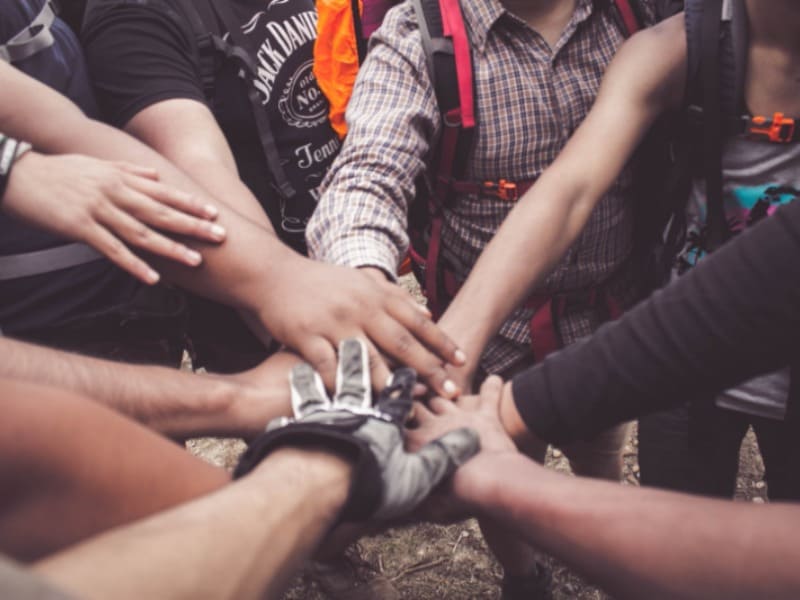In 1945, the year Indonesia gained its independence, the nation's first president Sukarno spoke in a speech about gotong royong as the ability to strive together. Channeling this spirit of gotong royong essentially means putting aside religious and ethnic backgrounds, as well as other forms of differences in order to work as a nation and overcome its challenges together. Over time, this has been one of the defining features of Indonesia as the world's largest archipelago that has over 1000 ethnic groups. But in reality Indonesians have not always been united. In recent years locals had been further divided by relentless political conflicts, as well as cases of discrimination and religious intolerance. The idea that Indonesia is a nation founded based on the spirit of gotong royong was slowly diminishing as today's society is getting more individualized.
Interestingly, in Indonesia's fifth week of confronting covid-19 crisis, local societies appear to be displaying a strong sense of solidarity and togetherness that has not been seen in a long time. While we surely have plenty of reasons to feel concerned, many Indonesians are still thinking about how others around them are coping with the crisis. Suddenly, they are learning to realize the true ethos of gotong royong by coming together to get through these trying times instead of arguing with each other. Here, we uncover some of the ways in which covid-19 has revived the culture of gotong royong within the contemporary context.
Gotong royong as a vehicle for community awareness
Across the globe, terms like ‘solidarity', ‘togetherness', and ‘community support' are becoming part of a new language of the pandemic that highlights a collective way of coping and surviving through the current crisis without necessarily being in the presence of one another. This presents a real challenge for the Indonesian society that is by nature a collectivist. Locals who are used to joining recitations and arisan (a social gathering that sees a group of typically female friends saving money by organizing a monthly rotating lottery), catching up with friends in the iconic megamalls, or going to the cinema and karaoke places must now work on reconfiguring their social interactions and adjust themselves to new ways of spending time together.
More recently, in an effort to stop the spread of the coronavirus, local media outlets and some government officials are encouraging people not to return to their hometowns to celebrate Eid Mubarak in May (a practice locally known as mudik) by popularizing the hashtag #janganmudik (no mudik). Mudik is normally a time where people who usually work in big cities travel back to their homes in rural areas and be with their families and close relatives. Gotong royong comes in as a tool that is often used to generate the public's awareness about the damage of breaking social distancing even for the sake of reuniting with families to celebrate a religious holiday. In this context, the concept has provided a new understanding of collectivism that no longer requires physical togetherness so that we can keep each other safe.
Gotong royong as a catalyst for philanthropy and altruism
Since the early days of social distancing, plenty of Indonesians have also been launching initiatives to mobilize support for communities. Unlike the previous point on community awareness, channeling gotong royong in this context sees local societies embracing the more conventional understanding of the concept that overlooks people's differences to focus on overcoming adversity together. From musicians gathering to hold a live streaming fundraising concert that raised over Rp 10 billion (US$ 619) and big brands like Gojek and Wardah making large donations to those affected by the pandemic, to influencers working pro bono to help the government raise awareness about covid-19 - these days we often hear stories of well-known, highly privileged figures and companies demonstrating gotong royong through philanthropic and altruistic acts.
Having said that, acts of gotong royong are also palpable across regular people who live in both urban and rural areas. In big cities like Jakarta and Bandung, locals are showing tremendous support for low-income people. For instance, they do this by creating movements to help ride-hailing drivers continue earning money through ordering food online more often and giving them more tips. We also see restaurants and warungs (local street food stalls) supporting drivers and street vendors by offering them free meals. Meanwhile, in rural areas, regional authorities have been taking the initiative to support local communities by establishing quarantine spaces in small villages, such as the ones in West and Central Java. There are also more information centres built on villages across the nation to disseminate accurate information on covid-19 and tackle disinformation. To this end, Indonesians are finally showing the power of gotong royong by standing united to do their part in navigating current crisis, regardless of who they are and where they come from.
Gotong royong in a post-pandemic world
In the wake of uncertainty, where cultural changes are accelerating at an unprecedented rate, it is often difficult to imagine how our society will look like in the near future. For Indonesians, it may be curious to see whether or not they will remain united once the pandemic is over and, more importantly, if they will continue embracing gotong royong. While answering these questions may seem tricky, the covid-19 crisis has shown us that Indonesians have never truly abandoned the spirit of gotong royong yet how the concept is manifested across local societies from time to time may depend on the rapidly changing cultural contexts. As one of the world's most generous nations, Indonesia is essentially defined by gotong royong based on its people's habits of giving to charity and supporting the community even in their normal, everyday lives. In a post-pandemic world, these will less likely change especially given a financial crisis looming on the horizon. By then, the Indonesian society will certainly need to rely on gotong royong in order to survive and rebuild itself.


